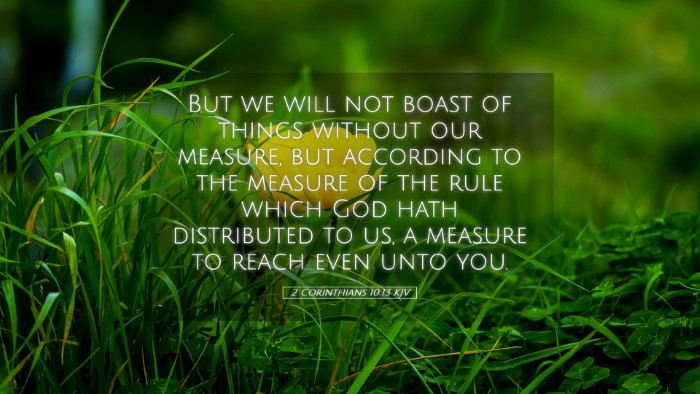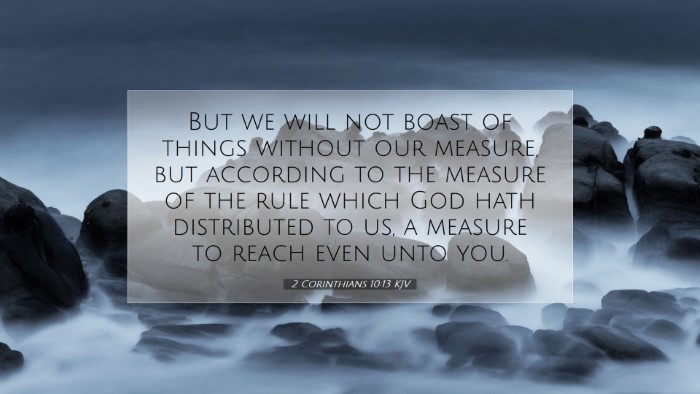Commentary on 2 Corinthians 10:13
Verse: "But we will not boast beyond our measure, but according to the measure of the rule which God hath distributed to us, a measure to reach even unto you."
Contextual Overview
The Apostle Paul writes to the Corinthian church, addressing concerns about authority, boasting, and the parameters within which he operates as a minister of the Gospel. This verse serves as a defense of his ministry and the guidelines established by God for apostolic work.
Insights from Matthew Henry
Matthew Henry emphasizes the humility exhibited in Paul's assertion of not boasting beyond his measure. He observes that true ministers of the Gospel should operate within the boundaries set by God. Henry articulates that boasting in one's own abilities or achievements is a dangerous path, leading to pride and disunity.
- Measure of Faith: Paul recognizes a divinely ordained 'measure' indicating a limitation to his ministry. This suggests that personal gifts vary, and each believer has a role within the body of Christ.
- Essence of Accountability: The apostle maintains accountability to both God and the community he serves, reminding readers that any boasting must be based on what God has done through them.
- Intent of Unity: The purpose of ministry is not individual glorification but the unity and edification of the church in Christ.
Insights from Albert Barnes
Albert Barnes cautions against the inclination to evaluate ministry based on human standards. He notes that Paul's measure was set by God, not by personal ambition or comparison with others. This idea reinforces the sovereignty of God in appointing leaders and defining their scope of influence.
- Divine Distribution: Barnes discusses the metaphor of 'measure' as a divinely assigned task, akin to the way land is measured and apportioned. This suggests a clear domain of ministry with defined responsibilities.
- Reaching Others: He elaborates on the reach of Paul's ministry, indicating that the measure helps extend not only his influence but also the message of Christ effectively to others.
- Rejection of Self-Exaltation: Barnes highlights that real spiritual authority comes through humility and recognizes the absence of pride in Paul’s tone.
Insights from Adam Clarke
Adam Clarke’s commentary elaborates on the concept of 'measuring' and its implications for ministry. Clarke indicates that to boast beyond the assigned measure represents a breach of the responsibility entrusted to a minister.
- The Role of the Minister: Ministers of the Gospel must be vigilant in recognizing their boundaries to avoid overstepping. Clarke encourages pastoral leaders to be aware of their limitations and strengths.
- Scriptural Foundation: Clarke references the Old Testament laws of measure, connecting the spiritual principle to the literal to highlight the importance of adherence to God's design.
- Spiritual Accountability: A key theme in Clarke’s writing is the notion that God expects accountability from His ministers, and each has a unique role that must be honored.
Theological Implications
This verse encapsulates profound theological insights about the nature of leadership in the Christian faith. It offers several implications for present-day ministry:
- Humility in Leadership: Paul sets an example for leaders to remain humble and recognize their limits.
- Divine Sovereignty: There is a strong sense of divine authority over ministry roles, highlighting that leaders are appointed and enabled by God for specific tasks.
- Mutual Edification: The emphasis on reaching others underscores communal responsibilities among believers, which fosters unity in purpose and faith.
Practical Applications for Ministry
Incorporating insights from this verse into practice can refine the approach of pastors and church leaders:
- Assessment of Ministry Scope: Leaders should regularly evaluate the 'measures' of their ministry, ensuring alignment with their divine calling.
- Promotion of Shared Ministry: Encourage a culture where gifts are recognized and shared among the congregation rather than hoarded by a leader.
- Focus on God’s Work: Boasting should be redirected toward God's work rather than personal achievement, shifting the narrative to one celebrating God's faithfulness.
Conclusion
2 Corinthians 10:13 provides a powerful reminder of the necessity of humility, accountability, and divine purpose in ministry. The reflections by Matthew Henry, Albert Barnes, and Adam Clarke offer timeless principles that can guide current and future leaders in their spiritual journeys and ministerial responsibilities. With these insights, we are encouraged to reflect on how we measure our own calling and to focus our boasts upon what God has accomplished within us and through us for His glory.


